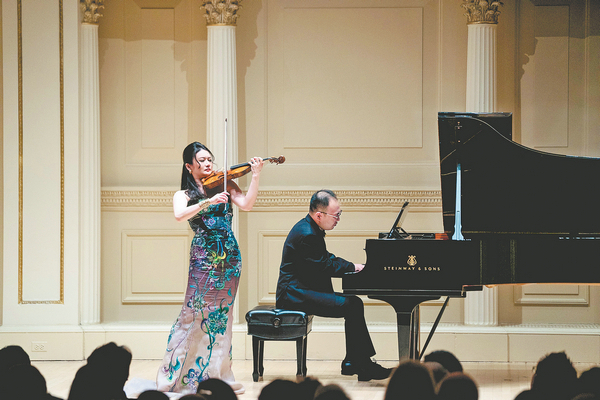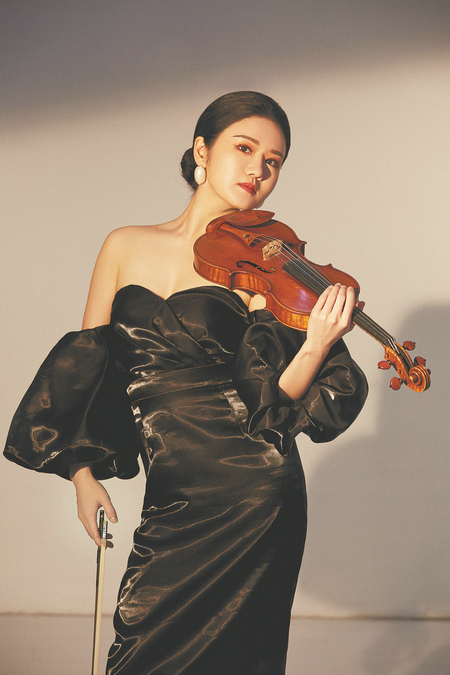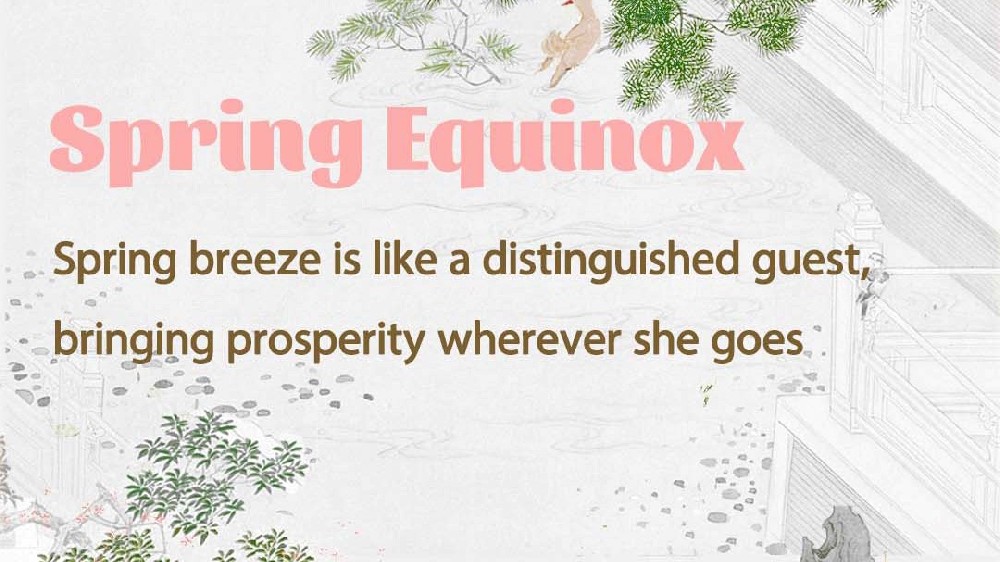Violinist hits perfect note with Carnegie ovation

Audience rises to applaud musician's talent and pride in Chinese music, Chen Nan reports.
When violinist Lao Li had her concert at Carnegie Hall, New York, on July 6, she was so touched that a Chinese piece, Violin Concerto No 1, by the acclaimed composer Zhao Jiping, was met with a standing ovation.
It was performed during the second half of the concert. After Lao finished the last note, she realized that the audience was standing, cheering and applauding.
"I was so overwhelmed and touched that the audience would react so warmly to a Chinese composition," recalls Lao, who left the stage after bowing three times. Along with pianist An Tianxu, she returned to the stage and played Saint-Saens' Introduction and Rondo Capriccioso, which was the last piece on the program. After the audience's enthusiastic applause, the concert ended after encores of two pieces by Lao and An, and took five curtain calls.
Violin Concerto No 1 by Zhao was commissioned by the National Centre for the Performing Arts in 2017.The concerto expresses and describes the generosity and kindness toward humankind.
Last year, the composer contacted Lao, hoping she would play the piece and give it a female perspective and a new energy. Lao spent a month learning the music piece and performed it for the first time along with the Guiyang Symphony Orchestra under the baton of conductor Zhang Guoyong during a concert tour in August 2022 in Zhao's hometown, Xi'an, Shaanxi province.
"I felt very connected to Zhao's Violin Concerto No 1, which is very warm and conveys universal love," says Lao. "I would always like to introduce more Chinese compositions to Western audiences and Zhao's Violin Concerto No 1 came to mind instantly when I prepared for the concert at Carnegie Hall."
According to Lao, she planned to give the concert at Carnegie Hall in the summer of 2020, but it was postponed due to the COVID-19 pandemic. In the first half of the concert, she played classical Western music, such as Chopin's Nocturne in C Minor, Tchaikovsky's Melodie, and Schumann's Sonata No 1 for Violin and Piano. In the second half of the concert, she presented Chinese music.
During her concert, Lao premiered a popular Peking Opera song, called Li Hua Song, or Ode to Pear Flowers, for the first time presenting through the violin rather than voice. The song, composed by Yang Nailin, rearranged by Xia Liang, was from Peking Opera production, The Royal Consort of Tang, which is about the legendary royal concubine Yang Yuhuan of the Tang Dynasty (618-907) and her tragic love affair with Emperor Li Longji. In 1925, Peking Opera master Mei Lanfang (1894-1961) premiered the Peking Opera piece by playing the role of Yang.
Lao is very fond of Peking Opera and decided to premiere the song as a violin piece.

"I used my violin to imitate Peking Opera singing, which is very challenging. I wanted to do something both to continue our culture, and in the meanwhile add some creativity. When I played the Peking Opera song at Carnegie Hall, the audience got a glimpse of the ancient art form through the interpretation of violin," Lao says.
It's not the first time that the violinist used her instrument to imitate sounds of different traditional Chinese music and instrument. In 2017, she premiered the violin version of Chinese Sights and Sounds, a suite consisting of 24 orchestral compositions by Bao Yuankai in 1991, by using violin to imitate sounds of traditional Chinese musical instruments, such as the erhu (Chinese fiddle), xiao (a vertical bamboo flute) and suona (a double-reed woodwind instrument).
During her recent concert at the Carnegie Hall, Lao also played Cai Diao, a selection from Bao's Chinese Sights and Sounds, which is adapted from a folk song of Yunnan province.
She has just finished recording an album with the leading classical music label Naxos, featuring most of the pieces she performed during the concert at Carnegie Hall.
Raised in Wuhan, Hubei province, and Beijing, Lao was introduced to the violin by her mother, who is a pediatrician and an early age music educator.
"My mother loves music and she still took violin lessons when she was pregnant. So the sound of the instrument has been with me even before I was born, I guess," says Lao.
After she was enrolled to study at the primary school affiliated to the Central Conservatory of Music, Lao studied with legendary violin professor Lin Yaoji (1937-2009) as his youngest student at that time.
At 18, Lao won a full scholarship to study at the University of Cincinnati College-Conservatory of Music. Later, she moved to Boston in the United States to study at the New England Conservatory of Music, where she gained her Bachelor's and Master's degrees. With a full scholarship, Lao continued her academic studies at the Reina Sofia School of Music in Madrid, Spain, with the legendary violinist and professor Zakhar Bron. Inspired by Bron's teaching approach, Lao has translated Bron's The Art of the Etude, a summation of his years of teaching, into Chinese along with a violin study book.
In 2017, when the Czech National Symphony Orchestra played during the Shanghai International Arts Festival, Lao stepped in at the last moment and earned enthusiastic reviews for her performance of Felix Mendelssohn's Violin Concerto in E Minor, Op 64.
"I can still recall that I had to practice on the flight because rehearsals started right after I landed in Shanghai and the concert opened on the same night," says Lao.
Violinist Donald Weilerstein once praised Lao's performance as "delicately touching, full of imagination and the warmth of sunlight".
In 2018, Lao returned to China and has been teaching at the Central Conservatory of Music in Beijing since then.
Related articles
-
 Shanxi Drum: Rhythm of Chinese Music
Shanxi Drum: Rhythm of Chinese MusicMore
-
 CPPCC member promotes traditional folk performance on campus to inspire the young generation
CPPCC member promotes traditional folk performance on campus to inspire the young generationMore
-
 Concert in celebration of Chinese Lunar New Year staged in U.S.
Concert in celebration of Chinese Lunar New Year staged in U.S.More
-
 Violinist hits perfect note with Carnegie ovation
Violinist hits perfect note with Carnegie ovationMore
-
 Timeless Rhapsody
Timeless RhapsodyMore
-
 Feature: Chinese New Year Concert in Australia presents symphonic conversation between East, West
Feature: Chinese New Year Concert in Australia presents symphonic conversation between East, WestMore
